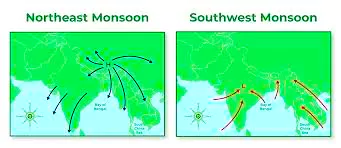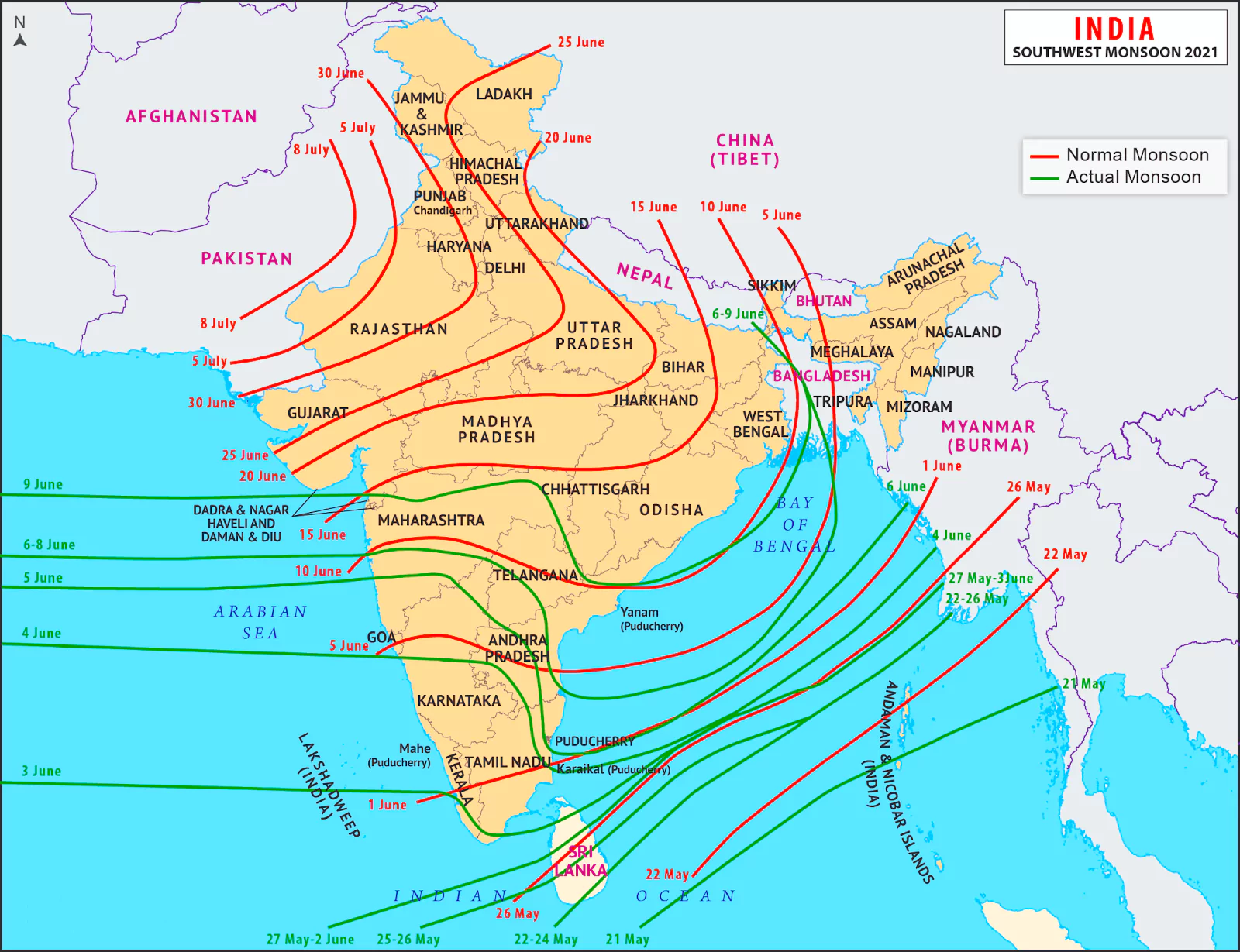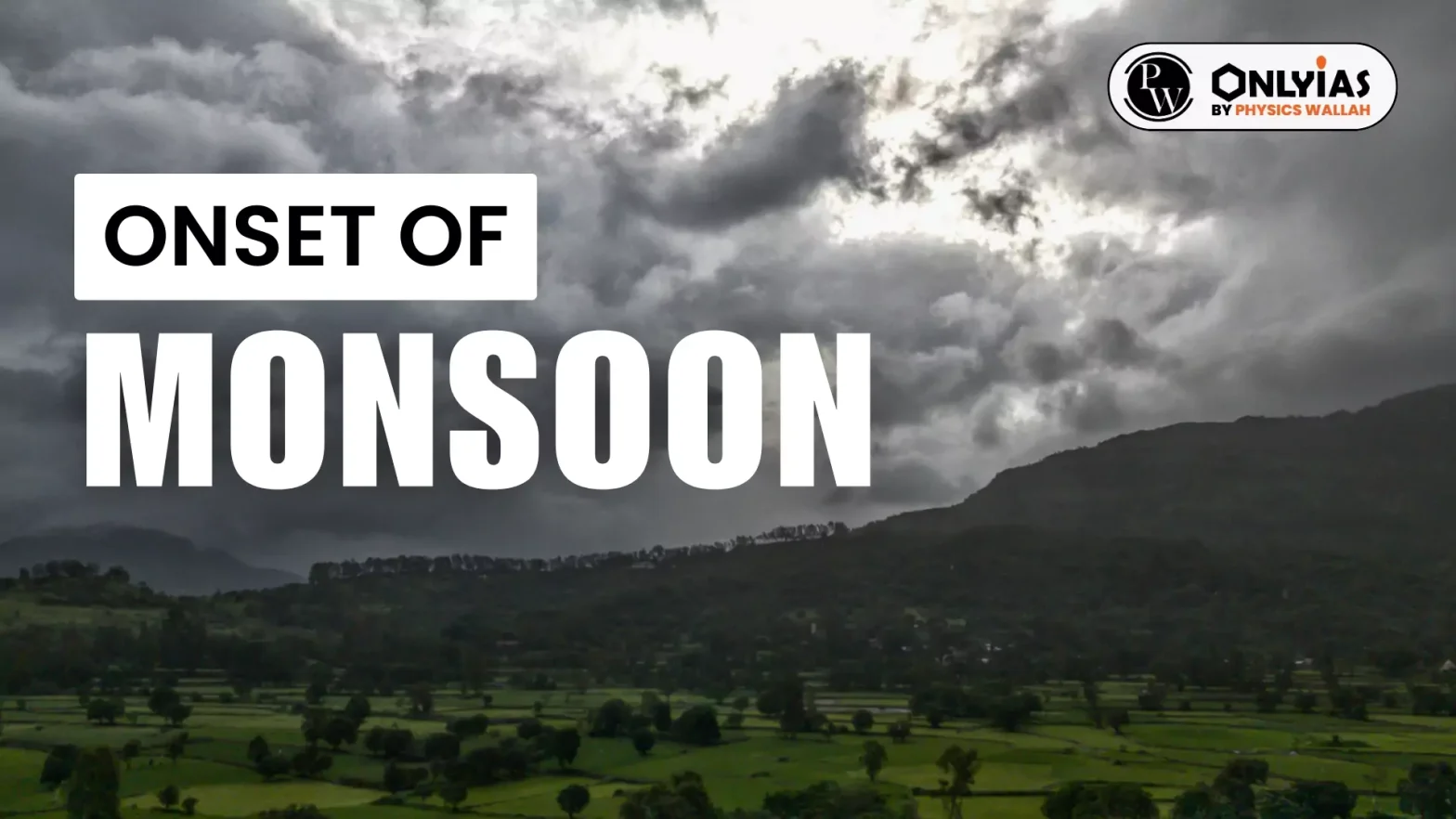The India Meteorological Department (IMD) has announced the arrival of the southwest monsoon.
Key Highlights Onset of Monsoon
- The climatic conditions are favorable for the monsoon to reach the Kerala coast in the coming days.
- The Southwest Monsoon is the primary rainy season for most of India, bringing much-needed water for agriculture.

- The Northeast Monsoon provides some rainfall to the southern peninsula, particularly Tamil Nadu.
- Typical Monsoon Pattern
- Andaman and Nicobar Islands: This region usually starts receiving monsoon rain between May 15 and May 20.
- Kerala Coast: This region typically starts receiving rain in the last week of May.
Enroll now for UPSC Online Course
Meaning of Onset of Monsoon

- Start of Monsoon Season: The onset of the monsoon (June-September)marks the arrival of the southwest monsoon over the Indian subcontinent.
- This occurs when the monsoon winds reach Kerala, the southernmost state of India.
- Starting months: This event usually happens around late May or early June.
- Annual Rainfall: The southwest monsoon provides over 70% of India’s annual rainfall.
- It is crucial for agriculture, water resources, and overall economic well-being.
Criteria for Declaring Monsoon Onset
The IMD broadly checks for consistent rainfall, its intensity, and wind speed over a specific area.
- Rainfall Requirements
-
- Consistency: At least 60% of 14 designated weather stations in Kerala and Lakshadweep must record a minimum of 2.5 mm of rain for two consecutive days after May 10.
- The 14 designated stations are:
- Minicoy
- Amini
- Thiruvananthapuram
- Punalur
- Kollam
- Alappuzha
- Kottayam
|
- Kochi
- Thrissur
- Kozhikode
- Thalassery
- Kannur
- Kasaragod
- Mangaluru
|
- Wind Speed and Direction: Westerly winds should reach up to 600 hectopascals (hPa) in the specified area from the equator to 10ºN latitude, and 55ºE to 80ºE longitude.
-
- Zonal wind speed in the area from 5-10ºN latitude and 70-80ºE longitude should be around 15-20 knots (28-37 kph) at 925 hPa.
- Heat Requirements- Outgoing Longwave Radiation (OLR): The OLR value should be below 200 watts per square meter (wm²) in the specified region to confirm the onset.
- OLR measures the energy emitted to space by the Earth’s surface, oceans
- This measurement should be within the region bounded by 5-10ºN latitude and 70-75ºE longitude, as per IMD guidelines.
Factors Affecting South West Monsoon Formation
- Differential Heating and Cooling
- Land-Water Contrast: Variation in temperature between land and water creates low pressure over the Indian landmass and high pressure over the surrounding seas.
- Position of Inter Tropical Convergence Zone (ITCZ)
- Summer Shift: During summer, the Inter Tropical Convergence Zone (ITCZ) moves over the Ganga plain, approximately 5°N of the equator.
- This zone is also called the monsoon-trough.
- It influences monsoon formation.
- High-Pressure Area over Indian Ocean
- East of Madagascar: A high-pressure area exists east of Madagascar, around 20°S in the Indian Ocean.
| Feature |
Northeast Monsoon |
Southwest Monsoon |
| Direction |
North-East |
South-West |
| Season |
Winter (October-November) |
Summer (June-September) |
| Rainfall Amount |
Lower intensity |
Higher intensity |
| Affected Regions |
Southern Peninsula (Tamil Nadu, Andhra Pradesh, etc.) |
Most of India (except North-West) |
| Origin |
Land (Siberian and Tibetan Plateaus) |
Sea (Arabian Sea and Bay of Bengal) |
| Impact on Temperature |
Relatively drier, cooler |
Humid, warmer |
-
-
- The intensity and position of this area impact the Indian Monsoon.
- Tibetan Plateau Heating: The Tibetan plateau heats intensely during summer, generating strong vertical air currents and forming low pressure about 9 km above sea level.
- Influence of Jet Streams
- Westerly Jet Stream: Movement of the westerly jet stream to the north of the Himalayas influences monsoon formation.
- Tropical Easterly Jet Stream: Presence of the tropical easterly jet stream over the Indian peninsula during summer affects monsoon patterns.
- Southern Oscillation (SO)
- Pressure Reversal: Normally, high pressure occurs in the tropical eastern south Pacific Ocean and low pressure in the eastern Indian Ocean.
- However, in some years, this pattern reverses which is known as the Southern Oscillation (SO).
Enroll now for UPSC Online Classes
![]() 29 May 2024
29 May 2024


